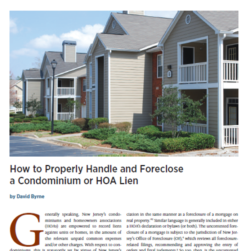Amendments to New Jersey’s Open Public Records Act May Prejudice Those Involved in Legal Disputes and Undermine the Law’s Purpose
By David J. Byrne and Nicole D. Miller
Every level of government possesses a treasure trove of information. Each New Jersey municipality and state agency is supposed to keep copious records relating to things like interactions with the public, police reports, permit applications, zoning variance requests as well as internal documents reflecting governmental decision-making. For many, many years, by virtue of New Jersey’s Open Public Records Act (“OPRA”), some of those records have been open to the public.
Recently, New Jersey’s legislature amended OPRA. Unfortunately, those amendments may make it much harder for parties anticipating, or involved in, legal disputes to get access to evidence they need to support their claims or defenses.
How OPRA Relates to Litigation and Legal Disputes
While not obvious at first glance, the recent amendments to OPRA are extremely significant to individuals and businesses involved in litigation, other legal proceedings, or potentially exposed to either.
Legal proceedings often involve “discovery.” “Discovery” is the process of requesting, and exchanging, information and documents relevant to the dispute. Discovery also often involves subpoenas or requests to third parties that may have documents or information that neither litigant possesses.
Sometimes, a local governmental body or state agency is such a third party. There are many types of matters in which governmental records can play a critical role: land use, real estate and/or development-related disputes and construction defect litigation, to name a few.
The Problem With the Recent Amendments to OPRA
Before the recent amendments to OPRA, a party involved in litigation could use OPRA to get such records. Now, such a party may be limited to the use of subpoenas.
For example, the revised OPRA, which goes into effect on September 3, 2024, provides, in part, that:
- Parties to a legal proceeding are not entitled to government records via OPRA if the record sought is within the scope of any court order in that proceeding or is within the scope of a pending litigation discovery request.
- Public agencies are not required to respond to a request if it “does not identify specific individuals or job title or accounts to be searched, a specific subject matter, and is not confined to a discrete and limited reasonable time period.” This creates a Catch-22 for requestors who likely could only obtain such detailed information from the very records they are seeking.
As noted, these amendments may unnecessarily increase the costs associated with procuring records from the government by forcing the use of subpoenas. These amendments also appear to undermine the public’s “right to know.” After the amendments to OPRA become effective in September, we will have a better sense of their impact on legal proceedings and the public in general.
If you have questions or concerns about OPRA and these recent amendments, please contact Nicole Miller or David Byrne at Ansell.Law.



